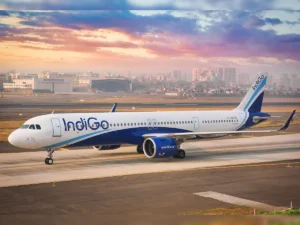India’s newest airlines had the highest increase in flights in May compared to April. IndiGo continues to dominate in absolute terms. In early May, just days after the country set a record for domestic passenger traffic on a single day, Go First caused a surprise. The company has announced that it will cease operations and file for voluntary bankruptcy. This announcement came unexpectedly and the situation is evolving. While GoFast is making a comeback against history, little has changed on the Indian aviation scene. This was mainly due to the company’s market share of less than 10 percent. In April, GoFast operated an average of 163 flights daily. The May total shows an average of 135 fewer flights per day since GoFast filed for bankruptcy, suggesting other airlines are increasing flights to make up the shortfall. . In June, airlines grounded some flights, 160 fewer flights per day than in April and 24 fewer flights per day than in May.
With constant tension between gaining market share, dealing with seasonality, and challenges with aircraft availability and crews, who really made the most of the situation? The immediate winner was Aqasa Airlines, which increased flights by 11.3% in May compared to April. Interestingly, this happened without any fleet additions this month and was entirely due to increased utilization of existing fleets.
Akasa Airlines also used all of its allotted slots and is one of only two airlines to ultimately request additional slots. In May, it operated an average of 863 weekly flights, 14.91% higher than the 751 weekly flights authorized at the start of the season. Indigo was the only other airline to do this, operating 11,506 weekly flights in May, compared with 11,465 scheduled flights when the schedule began. Alliance Air, the country’s sole state-owned carrier, came in second, operating 5.8% more flights in May than in April. Air India was next, up 5.2%. Air India’s compliance rate was 90.86% in May, with the company operating an average of 1,979 weekly flights compared to its approved schedule of 2,178 weekly flights. Vistara, which is set to merge with Air India next March, added 24 weekly flights, up 1.4% from April. The company used 92 percent of the schedule approved in May. Regional airline Star Air, which does not overlap with Go FIRST routes, expanded its schedule by 13% in May as it started operating E175s (Embraer planes) and launched additional flights.
IndiGo is not outdone in absolute numbers
With a market share of 60%, his IndiGo absolute numbers are huge and also a strong base. Indigo’s flights increased by only 1.1% in May from April, meaning an additional 131 flights per week. This airline has been on his 100% schedule in May and will probably grow even more in the coming months.
Indigo, like GoFirst, has struggled with groundings, with CXOs admitting it had between 30 and 40 aircraft at the end of its most recent quarter. IndiGo continues to accept new planes and slowly launches planes on the ground.
So who lost?
If anyone has lost in the short term, it’s SpiceJet. The company has approved and started scheduling 2,240 weekly flights. The airline operated 1,122 weekly flights in May, down 6% from April, when it also operated GoFast. The airline’s schedule adherence rate was only 50%. SpiceJet has reached settlements with multiple lenders in the past and plans to put some B737 and Q400 (Bombardier) aircraft into service in the coming weeks, with more planned to enter service by winter flight schedules. . However, problems with other lenders and an ongoing lawsuit with the company’s former owner, KAL Airlines, continue to derail plans.
FlyBig, which is largely confined to the northeastern states and eastern states, had a schedule adherence rate of just 47.27% in May. The regional airline has no overlap with Go FIRST routes and does not benefit directly or indirectly from the suspension.
One thing every airline wants is more capacity. But if the engine hadn’t failed, GoFast would have remained a going concern and the opportunity might never have come.





